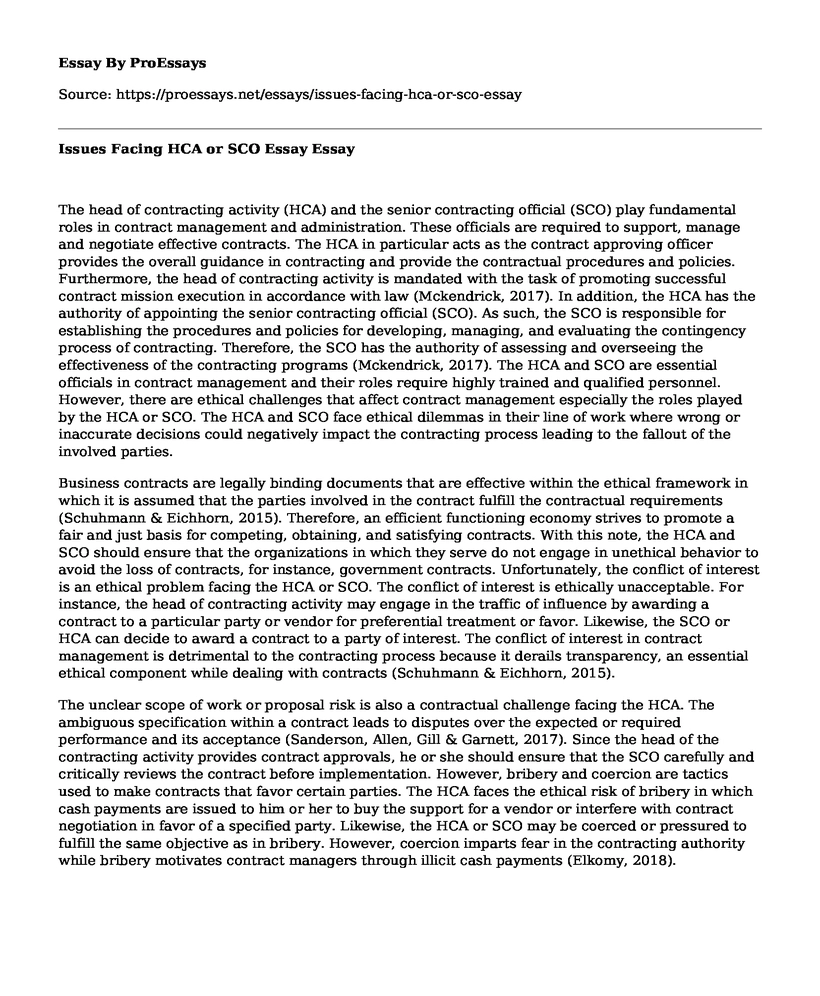The head of contracting activity (HCA) and the senior contracting official (SCO) play fundamental roles in contract management and administration. These officials are required to support, manage and negotiate effective contracts. The HCA in particular acts as the contract approving officer provides the overall guidance in contracting and provide the contractual procedures and policies. Furthermore, the head of contracting activity is mandated with the task of promoting successful contract mission execution in accordance with law (Mckendrick, 2017). In addition, the HCA has the authority of appointing the senior contracting official (SCO). As such, the SCO is responsible for establishing the procedures and policies for developing, managing, and evaluating the contingency process of contracting. Therefore, the SCO has the authority of assessing and overseeing the effectiveness of the contracting programs (Mckendrick, 2017). The HCA and SCO are essential officials in contract management and their roles require highly trained and qualified personnel. However, there are ethical challenges that affect contract management especially the roles played by the HCA or SCO. The HCA and SCO face ethical dilemmas in their line of work where wrong or inaccurate decisions could negatively impact the contracting process leading to the fallout of the involved parties.
Business contracts are legally binding documents that are effective within the ethical framework in which it is assumed that the parties involved in the contract fulfill the contractual requirements (Schuhmann & Eichhorn, 2015). Therefore, an efficient functioning economy strives to promote a fair and just basis for competing, obtaining, and satisfying contracts. With this note, the HCA and SCO should ensure that the organizations in which they serve do not engage in unethical behavior to avoid the loss of contracts, for instance, government contracts. Unfortunately, the conflict of interest is an ethical problem facing the HCA or SCO. The conflict of interest is ethically unacceptable. For instance, the head of contracting activity may engage in the traffic of influence by awarding a contract to a particular party or vendor for preferential treatment or favor. Likewise, the SCO or HCA can decide to award a contract to a party of interest. The conflict of interest in contract management is detrimental to the contracting process because it derails transparency, an essential ethical component while dealing with contracts (Schuhmann & Eichhorn, 2015).
The unclear scope of work or proposal risk is also a contractual challenge facing the HCA. The ambiguous specification within a contract leads to disputes over the expected or required performance and its acceptance (Sanderson, Allen, Gill & Garnett, 2017). Since the head of the contracting activity provides contract approvals, he or she should ensure that the SCO carefully and critically reviews the contract before implementation. However, bribery and coercion are tactics used to make contracts that favor certain parties. The HCA faces the ethical risk of bribery in which cash payments are issued to him or her to buy the support for a vendor or interfere with contract negotiation in favor of a specified party. Likewise, the HCA or SCO may be coerced or pressured to fulfill the same objective as in bribery. However, coercion imparts fear in the contracting authority while bribery motivates contract managers through illicit cash payments (Elkomy, 2018).
Conclusion
In conclusion, contract management is essential in business and in government because a contract is a legally binding document that spells the duties and obligation of the involved parties. With this note, the HCA and SCO are fundamental personnel in charge of the contracting process. However, these officials encounter ethical dilemmas in their line of work which could lead to early contract termination, loss of financial incentives, and even costly legal battles. The ethical risks that the HCA and SCO face include conflict of interest, bribery, coercion, and ambiguous contract specifications. These challenges can be overcome by ensuring transparency, accountability and abiding by the rule of law and ethical conduct.
References
Elkomy, S. (2018). Contract Management Capacity. Global Encyclopedia of Public Administration, Public Policy, and Governance, 1-5. Doi:10.1007/978-3-319-31816-5_3682-1
Mckendrick, E. (2017). Performance and discharge of the contract. Contract Law, 355-357. Doi:10.1057/978-1-137-60926-7_19
Sanderson, M., Allen, P., Gill, R., & Garnett, E. (2017). New Models of Contracting in the Public Sector: A Review of Alliance Contracting, Prime Contracting, and Outcome-based Contracting Literature. Social Policy & Administration, 52(5), 1060-1083. Doi:10.1111/spol.12322
Schuhmann, R., & Eichhorn, B. (2015). From Contract Management to Contractual Management. European Review Of Contract Law, 11(1), 1-21. Doi: 10.1515/ercl-2015-0001
Cite this page
Issues Facing HCA or SCO Essay. (2022, Aug 01). Retrieved from https://proessays.net/essays/issues-facing-hca-or-sco-essay
If you are the original author of this essay and no longer wish to have it published on the ProEssays website, please click below to request its removal:
- International Business in China: Articles Analysis Essay
- The Importance of Youth Entrepreneurship Essay
- Business Law Case-Analysis Paper Example
- Essay on Hardee's: Employee Development Challenges and Performance Struggles
- Paper Example on Popsy's Recipe Leaked: CEO Acknowledges Criminal Violation
- Gaining Financial Support: The Key to Entrepreneurial Success - Essay Sample
- Paper Example on Amazon.com: Global Giant in Retail E-commerce, CSR Commitment Questioned







